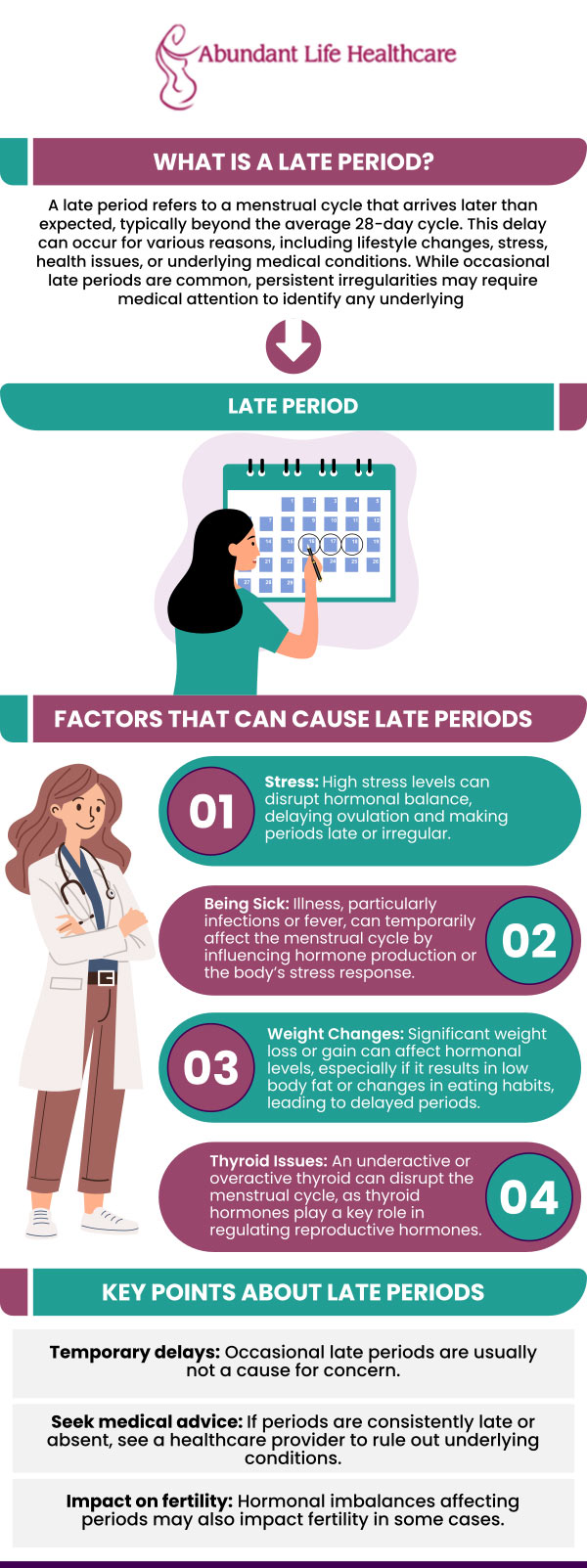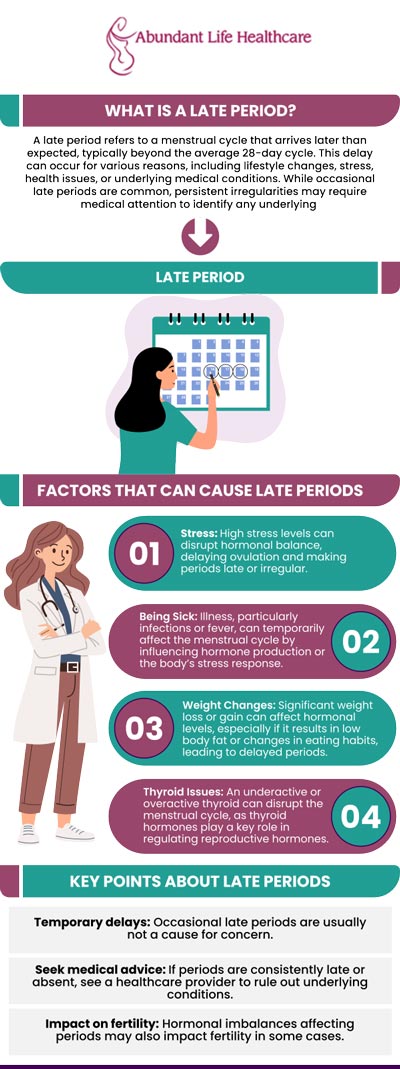How Late Can a Period Be? When to Be Concerned
A period is generally considered late if it is more than seven days past your expected start date. While occasional delays can be normal due to factors like stress, significant weight changes, or intense exercise, consistently late or missed periods can be a cause for concern. If your period is regularly late or you have missed three or more periods in a row and a pregnancy test is negative, consult Dr. Marc Jean-Gilles, DO, FACOG. For more information, contact us today or book an appointment online. We are conveniently located at 601A Professional Drive, Suite 370, Lawrenceville, GA 30046.


Table of Contents:
How late can your period be without being pregnant?
Is it possible to be 7 days late and not be pregnant?
How much delay in periods is normal?
How many days are too late until I worry?
Late menstrual period can be concerning, but it’s important to know that there are many reasons besides pregnancy why your cycle might be delayed. For most adults, a typical menstrual cycle ranges from 21 to 35 days, and up to 45 days for teens. If your period is late by a few days or even up to a week, this is usually not a cause for immediate worry, especially if your cycle is sometimes irregular.
There are several factors that can cause your period to be late, including stress, changes in weight, excessive exercise, illness, travel, or natural hormonal fluctuations. Medical conditions such as polycystic ovary syndrome (PCOS) or thyroid disorders can also disrupt your menstrual cycle. Our experienced team can help you explore these possibilities and determine if further evaluation is needed.
If your period is more than a week late and pregnancy is unlikely, know that occasional delays are normal. However, if you notice that your periods are consistently more than 7 days late, or if you miss more than one cycle without a clear reason, it’s a good idea to schedule an appointment with one of our providers. This is especially important if you have other symptoms such as severe pain, unusually heavy bleeding, or signs of hormonal imbalance like unexpected hair growth or acne.
We encourage our patients to track their menstrual cycles, as this can help identify what’s normal for you and make it easier to spot any changes. If you’re ever uncertain about a delayed period, or if irregular cycles become a pattern, the caring professionals at Abundant Life Healthcare are here to support you.
At Abundant Life Healthcare, we understand that a late period can be concerning, but it’s important to know that being seven days late does not always mean you are pregnant. Menstrual cycles can naturally vary, and there are many reasons—other than pregnancy—for a delayed period.
Common factors include stress, changes in weight, excessive exercise, illness, travel, and hormonal imbalances such as thyroid disorders or polycystic ovary syndrome (PCOS). Certain medications, including some forms of birth control, may also impact your menstrual cycle. Even women with typically regular periods can sometimes experience minor hormonal fluctuations that lead to a late period.
If you are sexually active and your period is late, we recommend taking a pregnancy test to rule out pregnancy. However, if you continue to experience late or missed periods, or if you have other symptoms that concern you, our compassionate team is here to help. We offer thorough evaluations to identify the underlying cause and provide personalized care to support your reproductive health and overall well-being.
A delay in the menstrual period can be concerning. For most women with regular cycles, periods typically occur every 21 to 35 days. A short delay—up to seven days beyond your expected period—can be normal and may be due to factors like stress, changes in routine, significant weight changes, illness, or travel.
However, if your period is delayed by more than a week and you are sexually active, pregnancy is a possibility, and taking a pregnancy test is recommended. Women with irregular cycles may notice natural variations, but frequent or prolonged delays could indicate underlying medical conditions such as polycystic ovary syndrome (PCOS), thyroid disorders, or other hormonal imbalances.
At Abundant Life Healthcare, our team is here to support your reproductive health. We encourage you to schedule an appointment if:
• Your period is delayed by more than 90 days (three months)
• You miss periods frequently or have irregular cycles
• You experience severe pain, abnormal bleeding, or other symptoms of hormonal imbalance
While a mild delay in your period is often nothing to worry about, persistent or significant changes in your menstrual cycle should be evaluated. The caring professionals will work with you to identify any underlying issues and develop a personalized treatment plan to help you achieve optimal health and peace of mind.
While menstrual cycles can naturally vary, a period is generally considered late if it hasn’t started within five to seven days of your expected date. Factors like stress, illness, weight changes, travel, or hormonal fluctuations can sometimes cause a delay.
If your period is more than a week late and you are sexually active, we recommend taking a pregnancy test. If you are not pregnant but notice your period is consistently more than a week late, or if you miss more than three periods in a row, it’s important to schedule an appointment with one of our caring providers at Abundant Life Healthcare. We can help determine if an underlying health condition—such as polycystic ovary syndrome (PCOS), thyroid disorders, or another hormonal imbalance—may be contributing to these changes.
Additionally, if you experience symptoms like severe abdominal pain, unexpectedly heavy bleeding, or signs of infection, please contact Abundant Life Healthcare right away. Your health and peace of mind are our top priorities, and we are here to provide guidance and support for all your women’s health concerns. For more information, contact us today or book an appointment online. We are conveniently located at 601A Professional Drive, Suite 370, Lawrenceville, GA 30046. We serve patients from Lawrenceville GA, Suwanee GA, Snellville GA, Duluth GA, Dacula GA, Lilburn GA, Loganville GA, Auburn GA, and surrounding areas.
Check Out Our 5 Star Reviews


Additional Services You May Like

Additional Services You May Like
- Obstetrics
- Pregnancy
- Gynecologist
- Birth Control
- Labiaplasty
- Microblading
- Weight Loss
- Semaglutide GLP-1
- Pap Smears
- Pelvic Pain
- Laser Hair Removal
- In House Ultrasound (Including 3D)
- Vaginal Birth After C-Section (VBAC)
- Pregnancy As High Risk
- Multiple Gestations
- Postpartum Counseling
- 24hour/365days On Call Service
- Annual Exam
- Abnormal Uterine Bleeding
- Management Of Endometriosis
- Ultrasound
- Pelvic Organ Prolapse
- Urinary Incontinence
- Perimenopause And Menopause
- Sexual Dysfunction
- Fat Freeze (Like Cool Sculpting)
- Body Contouring
- Ozempic
- Civil Surgeon
- Hormone Replacement Therapy
- Immigration Medicine
- Biote Hormone Pellets
- GLP-1
- Peptide Therapy




